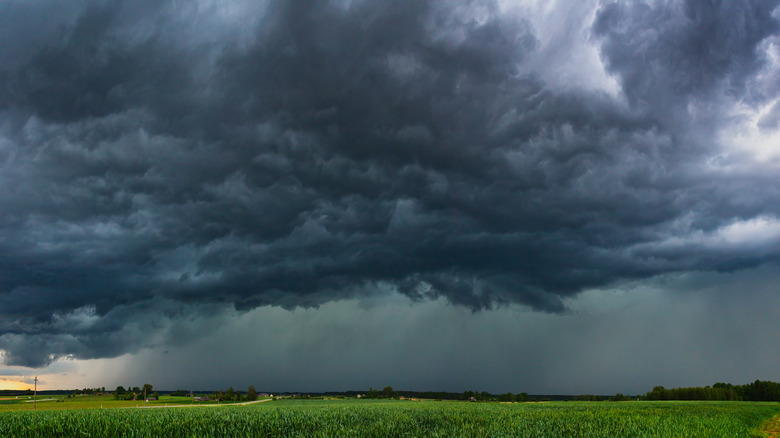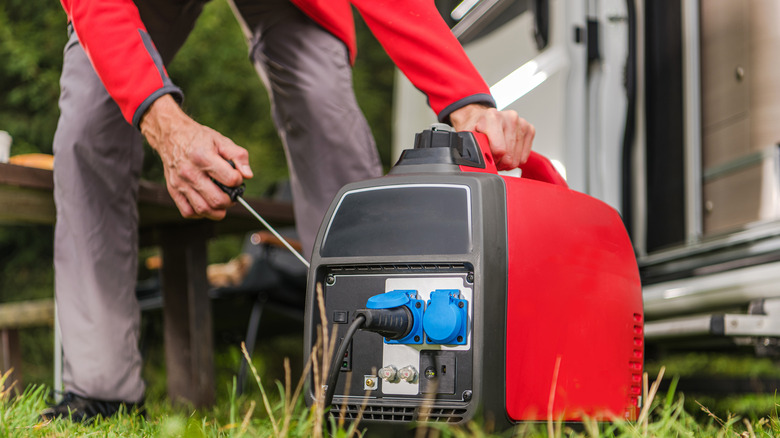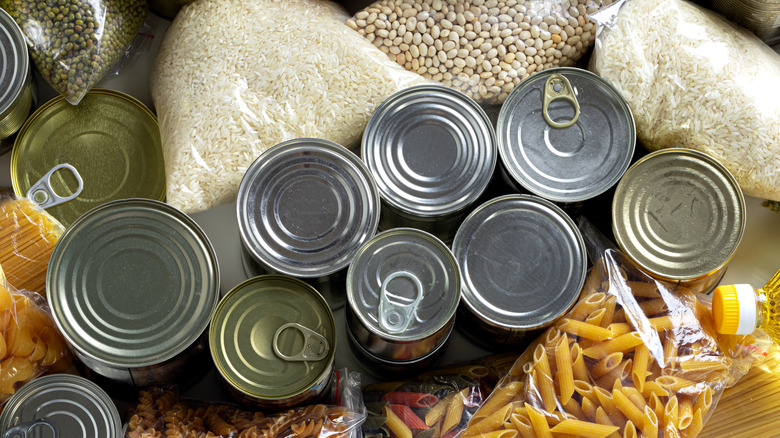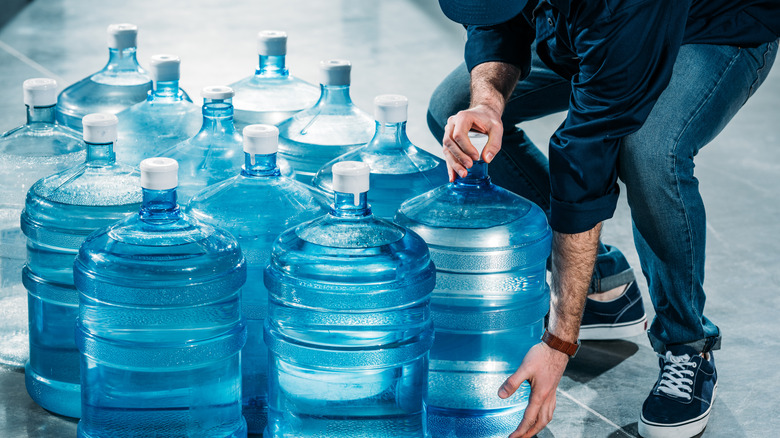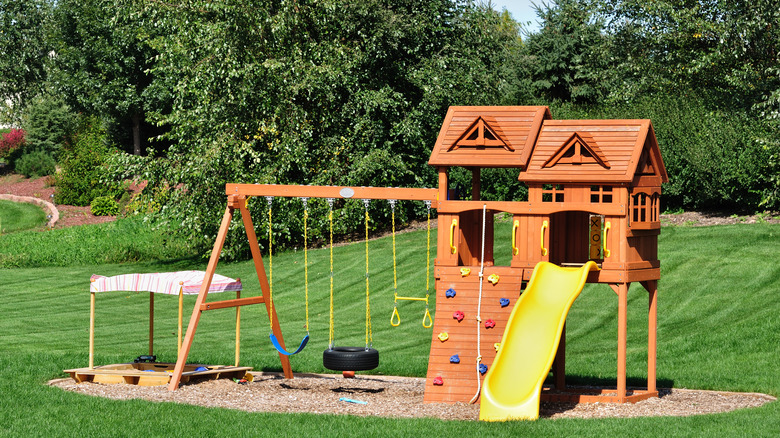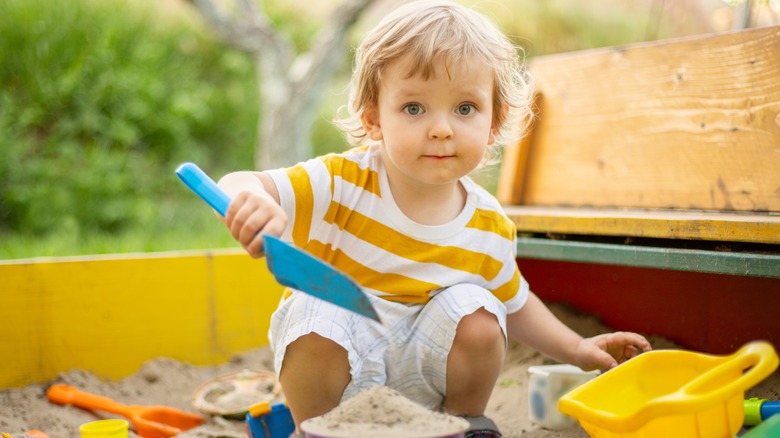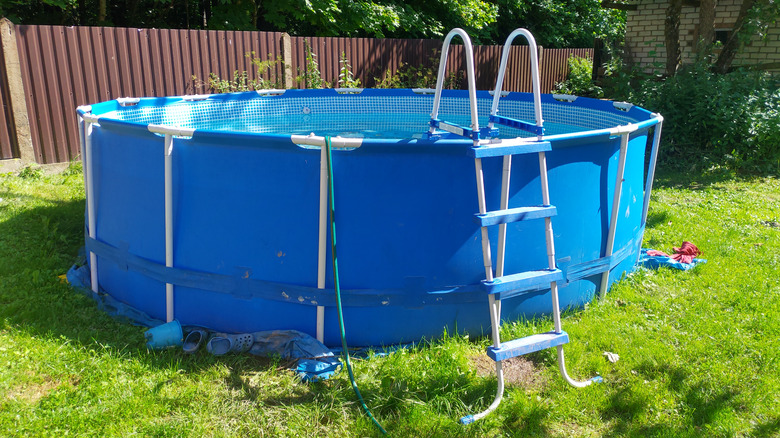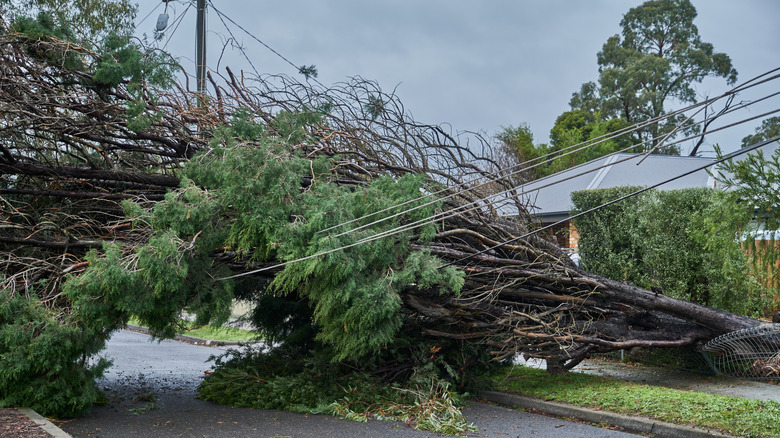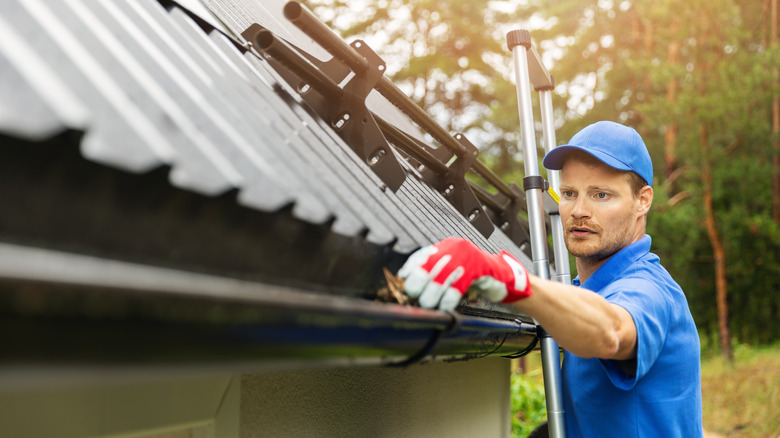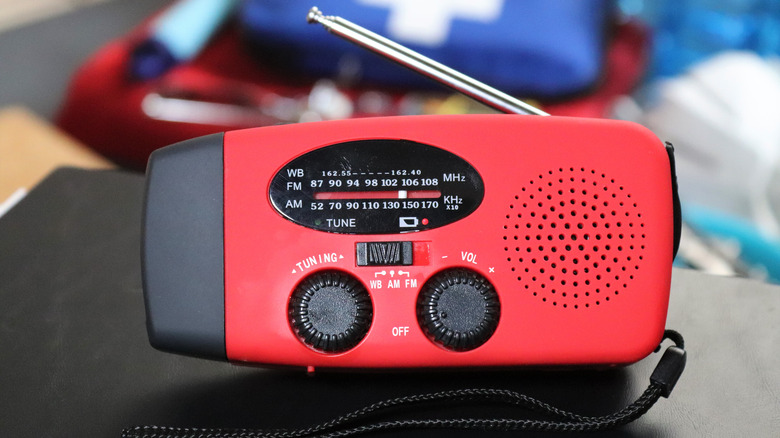Ways To Prepare For A Severe Summer Storm
With summertime in full effect, now's the time to enjoy warm weather, sunny skies, and participating in fun outdoor activities. What happens when the weather turns treacherous with regards to severe thunderstorms? Facilities Net advises being prepared by bringing anything in from the backyard or front yard that may get carried away by the storm. Consider any branches that may need to be trimmed and disposed of before a massive storm hits. It may be suitable to take before pictures as documentation for insurance companies once the damage outside becomes severe.
According to Shumate, the weather doesn't change too much during the summer months of June, July, and August. These months are humid with a bout of scattered thunderstorms. Thunderstorms are caused by a combination of moist air and heat. Be on the lookout with local weather apps to see if a thunderstorm is approaching. Get prepared by following these steps.
Find generators
To provide a temporary source of power, buy a portable generator, as stated by Air & Energy. Portable generators run for 10 to 11 hours at a time at about 50 percent loaded capacity. If someone runs a portable generator longer than its allotted period, it could pose a fire safety hazard. Keep children and pets away from generators so they don't get severely injured. Most generators are fueled by propane or gas. Propane-fueled generators could run between three to 10 days. Natural gas fueled generators could run for days on end. When using the portable generator in a garage, keep the garage doors open to prevent carbon monoxide poisoning.
Portable generators are used to produce temporary electricity to prevent food from spoiling or being wasted (via Patch). Everyone lives in a digital world to stay informed. Having a portable generator allows families to still use the internet, television, and radio during severe weather storms when power is out. Portable generators are also helpful to people who depend on respirators and kidney dialysis. They're great for businesses such as libraries, pharmacies, and grocery stores to provide supplies for families who need to stock up on necessities during storms.
Have emergency lights
When a severe thunderstorm knocks out electricity throughout an area, finding light sources should be a top priority. Go Sun suggests buying solar lights, which are inexpensive, and can glow for over 72 hours. One tidbit to keep in mind about solar lights is that there's no storage for additional electricity accumulated within the day. Electricity needs to be pulled from the same sources that other people use who don't have solar lights. By calling an electrician or solar panel expert, batteries and capacitors could be installed to access electricity more readily. Batteries and capacitors would come in handy during power outages.
For those who can't find time to install solar lights, keep stock of flashlights and battery-operated emergency lanterns at home in case of emergencies. Flashlights can be found at home stores and big box stores. Check out sporting and camping stores as well to have an abundance of choices. Be aware of using lit candles during a power outage. Leaving candles unattended could cause fires. Parents need to keep an eye on their children around open flames.
Stock food
To prepare for a thunderstorm, stock up on canned and boxed nonperishable food, as stated by Oklahoma State University Extension. Parents should be mindful of what their children's food preferences are and stay within their tastes. Be aware of any dietary restrictions or allergies the family may have. Cans of soup that are low in sodium and low in sugar could be for family members watching their salt intake. Be sure to purchase disposable utensils and cups. Pets need nonperishable, dry food as well. Keep food stored in cool, dry places to avoid spoiling. Make sure all food is neatly packed and tightly closed after use to prevent spillage.
Don't forget to find foods that have protein in them, like granola bars (via Cummins). Dried fruits like raisins and apricots are other healthy choices of foods to have in case of an emergency. High-energy foods such as beans, nuts, and trail mix could be useful as well. For seasoning, stock up on salt, pepper, and sugar. Remember vitamins for supplemental nutrient support. Purchase ready-made formula for babies who haven't weaned off their bottles quite yet.
Store water
Having water is essential for emergencies. According to the Centers for Disease Control and Prevention, storing one gallon of water per person per day for a three-day period is a good idea. Try to store more water during warmer seasons and for family members who are pregnant or elderly. Check to make sure bottles of water at home aren't expired. It's advisable to find FDA-approved food grade storage containers at camping or surplus stores. These kinds of durable containers are non-toxic. They come with an easy-to-close top and an easy-pour opening.
It's important to sanitize before using any container to store water. Mix one teaspoon of liquid household chlorine bleach in one quart of water. Cover the container and shake it for a few seconds. After half a minute, pour the solution down the drain and let the container air dry or rinse it out before using. Label containers as stored drinking water. Stored water should be replaced every six months. Try to place stored water in a cool room without direct sunlight. Keep water away from toxic pesticides and household cleaning products.
Fans
During severe thunderstorms, central heating and air systems don't work when the power is out. Investing in ceiling fans reduce cooling costs and help in times of need, as said by Sylvane. To preserve energy, turn on a ceiling fan in a room with people in it instead of leaving it on when there's no one in there. Ceilings fans help with circulating the air that comes from an air conditioner as well. Standalone fans work in small rooms and are easy to move from area to area. Desk and table fans are great for individual use. In warmer climates, some people buy misting fans to stay cool. Misting fans keep people and pets feeling 30 degrees cooler on average.
There are downsides to portable fans, (via NBC News). In extremely humid climates and warm rooms, there is dryness in the air. People don't sweat when there's stagnant dryness and the fan has nothing to evaporate. The fan blows around dry air instead. Installing ceiling fans and window fans is more effective than just using a couple of portable fans in a room. Check into rates and ceiling installation costs before making a commitment.
Check backyard equipment
It's important to check areas of the backyard before major storms erupt. Jacksons Fencing suggested to cut down and remove loose tree branches, especially those around windows, fences, and power lines. Patio furniture and flowerpots should be placed somewhere inside the home or inside of the garage so as not to get damaged. When building a fence around the backyard, make sure the fence posts are at least two feet deep underground to ensure sturdiness.
Backyard playset equipment should be well-anchored (via Own Playground). Need to make sure the backyard playset is anchored with enough durability? Concrete is long-lasting and will stand up well against rough weather. Be aware that concrete needs to be poured with precision and the playset won't be able to move to other parts of the backyard once set. Twist-in-ground playset anchors are easy to twist into soil or partial concrete, but be careful of protruding parts that may cause tripping hazards. The benefit of twist-in-ground anchors for securing a playset is that the playset can be moved to another place in the backyard if necessary.
Bring in outdoor toys
Want a way to get the family involved in cleaning the backyard? Assign duties to each family member to clean up and store outdoor toys before a storm hits, as prescribed by Spare Foot Blog. Preschool-aged children could help put toys away in a bin or a toy chest. Teenagers may like the idea of building their own DIY storage unit. As far as cleaning goes, large plastic playset toys such as playhouses and tricycles could be washed with a vinegar and water solution to get rid of grime and dirt. Baking soda mixed with water creates a paste that could be used to clean plastic toys as well. Mix water and liquid soap in a bucket and grab a sponge to wipe down bicycles, scooters, and skateboards.
Try to develop an organizational system for long-term use with outdoor toys. Think of categories such as balls, water toys, sandbox toys, and sports equipment. Small balls and soft balls could be placed into a mesh net bag and hung on the garage walls for later use. Don't know what to do with rubber ducks and tugboats? Place them inside plastic bins and store them in a hallway closet. Dust and wipe down sandbox toys and put them inside plastic bins for future use as well. Children could take out sports equipment only for practice or games to alleviate outdoor clutter.
Take care of outdoor pools
When it comes to taking care of outdoor pools, Namco advises against draining the water from them. Owners fear that an overabundance of rain will cause an overflow of pool water, leading to flooding and property damage. The weight of the pool water keeps the above-ground pool in place without detaching from the ground. Make sure to turn off the circuit breaker connected to the pool pump and motor. If possible, be sure the pool pump is covered with waterproof or plastic covers.
Instead of using a pool cover during a storm, which could rip off and fly away due to high winds, use a skimmer to fish out leaves and twigs (via Fronheiser Pools). After the storm has passed, inspect pool equipment to make sure nothing is broken. Scrub the walls of the pool and turn on the pool vacuum. Try a chlorine shock treatment that will rebalance the water's chemistry.
Get pets indoors
While it's pertinent that pets exercise outdoors, during storms they should be kept inside of the home. As written by Pet MD, cats who are outdoor cats should be inside. Make sure pet cats aren't hiding under cars. If a cat takes shelter under a car, the car could get struck by lightning and the cat could get seriously hurt. Pets should be microchipped. In case of an emergency if the cat or dog runs away from home, they could be identified by animal control when found and brought back to their rightful owners. Grab blankets at home and spread them out on the floor of a living room for pets to lie down on and get cozy.
Keep pets occupied during storms by distracting them away from loud noises. Play with dogs by giving them chew toys or roll balls along a floor. Cats like feathered toys. Pets may do well listening to calming music or relaxing near a portable fan. Keep home lights on so pets aren't worried about lightning. About a half hour after the storm has passed, pets could go back outside to do their business and run off their energy. If anxiety persists continually when storms occur, it may be best to speak with a pet specialist trainer.
Keep children occupied
To eliminate fear and anxiety, parents need to keep children occupied during storms. Toys in the Dryer advises getting children involved with emergency planning by having them create first aid kits. Grab bandages, ointment, batteries, flashlights, and healthy snacks to place inside of a kit. Find delicious salty, sweet, and savory treats to munch on. Create a snack that doesn't require heat or refrigeration like trail mix. Give each child their own personal baggie filled with raisins, peanuts, M&Ms, and pretzels.
What about children who like crafts? Have them make a tornado out of a plastic bottle, glitter, dish soap, and water (via Science Kids). All they need to do is fill ¾ of an empty plastic bottle with water, add a few drops of dish soap, and sprinkle in glitter. Tighten up the plastic bottle cap and shake to emulate a tornado. For classic game ideas, play I-spy and teach children about object recognition. Make a fort in the living room by piling pillows, cushions, and blankets on top of each other. Bring over flashlights and books and a snug safe space is created as a shield from the treacherous outdoors.
Clear away branches
Take care of trees before and after storms. According to TC Palm it's a good idea to trim away any unruly branches on trees before a major storm hits. For large-scale tree cleanup projects, call an arborist to remove weak branches on older trees. It'd also be a good idea to cut away any large tree limbs if they obstruct traffic or pose danger. For those who'd like to plant more trees around their home property, it might be a good idea to add a few small trees, and plant away from the house, garage, sidewalks, and driveways (via The Morton Arboretum). Planting too close to the home may cause branches to fall on the roof. Keep trees away from power lines to prevent fallen limbs from causing power outages.
After heavy storms, be aware of low branches and downed lines (via Arbor Day Foundation). Broken tree branches should be removed from the area, especially small, jagged branches to alleviate injuries. To maintain appearances, small branches should be pruned where they join large branches. Large branches that have been destroyed during a storm should be cut back to the trunk of the tree. Repair torn bark on trees by using a knife or a chisel to smooth down rough parts.
Clean gutters before a storm hits
Maintain gutters before and after a storm. Rain Gutters Solution stated that twigs and leaves could clog gutters if there are no gutter guards in place. Seams in gutters should be sealed to prevent leaks. Gutters overflow due to clogged downspouts. Make sure to take a hose to spray the downspouts on top of the gutters so water flows down at the bottom. Once a storm has passed, do a thorough inspection of the home, and make sure gutters aren't dented, sagging, or loose.
Before a storm hits, grab sturdy work gloves and safety goggles to remove debris from home gutters (via Storm Master Gutters). Instead of climbing on the roof, be safe by using a ladder to climb up and clean. Leaf blowers, brooms, or power washers could be used to sweep the roof. Be careful when using leaf blowers or power washers because sometimes the dirt doesn't get cleaned up, but just moves to another location. If necessary, use a wet/dry vacuum to soak up unwanted liquids and vanquish grime.
Working ahead
During electrical blackouts, people may need to go to a library to work or to study. Libraries are more than just places to borrow books and read. Libraries often partner with emergency workers and first responders to provide knowledge and space for those experiencing personal crises and weather emergencies, as stated by The Conversation. For children who desire quiet spaces, there are often rooms in libraries where they can relax, draw, and color on their own. This will take their minds off worrying about storms.
Adults and children who work or do school remotely will need tables and computers at the library. For those who are working with tight deadlines, going to a library or a coffee shop that has Wi-Fi can help you stay on track. For families who are in desperate need of food and clothing, libraries partner with food banks to provide what they can to people within the community.
Stay tuned in
Families should tune into weather alerts to find out when storms will hit their area. Duke Energy Illumination discusses how portable radios were distributed to citizens in South Carolina who were most vulnerable to hurricanes and severe storms. Regardless of what state someone lives in, it helps to check out a retailer that sells portable radios in case of emergencies. Some portable radios are small enough to fit into a first aid kit or an emergency kit. Be sure to buy one with clear instructions on how to operate it.
It's best to be prepared during severe thunderstorms because portable radios come in handy during power outages. Weather alerts provide a sense of safety and security for those who may feel anxious when dealing with possibly-dangerous weather conditions. For extra caution, download a weather app to a cell phone to get notifications. Weathering storms doesn't have to be difficult. Emergency preparations should be made beforehand. Make sure you have adequate food and water on hand. Parents should also be watchful of their children and pets. And, remember that storms pass and sunnier days will come.
